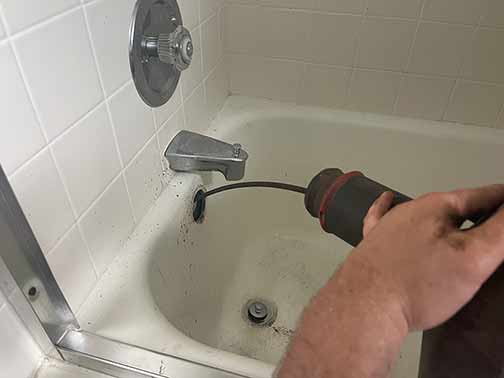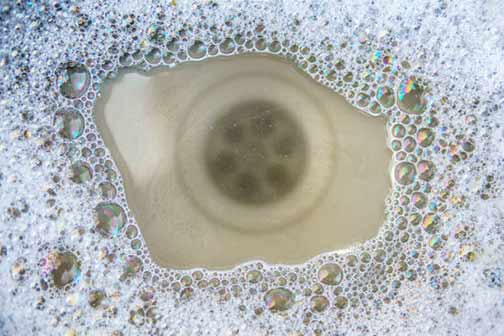The Importance of Addressing Slow Drains Immediately
Slow drains are often dismissed as minor inconveniences, but they can signal more serious underlying issues in your plumbing system. Ignoring slow drains can lead to significant financial and practical repercussions. Understanding the importance of addressing slow drains immediately can save you from costly repairs and extensive damage to your property.
Common Causes of Slow Drains
Slow drains can be caused by a variety of factors, each requiring different approaches for resolution. Common causes include:
- Clogged Pipes: Accumulation of hair, grease, soap scum, and other debris can create blockages in the pipes, leading to slow drainage.
- Tree Root Intrusions: Tree roots can infiltrate sewer lines, causing obstructions and hindering the flow of water.
- Pipe Corrosion: Over time, pipes can corrode and develop rough surfaces that trap debris, resulting in slow drains.
- Poor Pipe Installation: Improperly installed pipes can create areas where water flow is restricted, causing slow drainage.
Financial Repercussions of Ignoring Slow Drains
Ignoring slow drains can lead to significant financial repercussions. The longer the issue is left unaddressed, the more severe the damage can become, leading to costly repairs. Some of the financial consequences include:
- Increased Repair Costs: Minor clogs can often be resolved with simple fixes, but if left untreated, they can lead to major blockages that require professional intervention and expensive repairs.
- Water Damage: Slow drains can cause water to back up and overflow, leading to water damage in your home. Repairing water damage can be costly and may require replacing flooring, walls, and furniture.
- Mold Growth: Standing water from slow drains can create a breeding ground for mold and mildew. Mold remediation can be expensive and may pose health risks to you and your family.
- Decreased Property Value: Persistent plumbing issues can negatively impact the value of your property. Potential buyers may be deterred by the presence of slow drains and the associated risks.
Practical Repercussions of Ignoring Slow Drains
In addition to financial repercussions, ignoring slow drains can lead to practical issues that affect your daily life. Some of the practical consequences include:
- Unpleasant Odors: Slow drains can cause foul odors to emanate from your sinks and drains, making your home less pleasant to live in.
- Inconvenience: Slow drains can disrupt your daily routine, making it difficult to perform tasks such as washing dishes, taking showers, and using the toilet.
- Health Risks: Standing water and sewage backups can pose health risks, exposing you and your family to harmful bacteria and pathogens.
- Plumbing Emergencies: Ignoring slow drains can lead to plumbing emergencies, such as burst pipes or sewage backups, which require immediate attention and can be highly stressful.

Hidden Plumbing Problems Associated with Slow Drains
Slow drains are often a symptom of hidden plumbing problems that require professional assessment and intervention. Some of the hidden issues that may accompany slow drains include:
- Damaged Sewer Lines: Slow drains can indicate damage to your sewer lines, such as cracks, leaks, or collapses. Damaged sewer lines can lead to extensive repairs and require professional expertise to resolve.
- Pipe Blockages: Slow drains can be caused by blockages deep within your plumbing system. These blockages may require specialized equipment and techniques to remove.
- Septic System Issues: If you have a septic system, slow drains can signal problems with your septic tank or drain field. Septic system issues can be complex and costly to address. By regularly scheduling a septic tank pumping service, you can avoid most septic issues.
- Improper Venting: Proper venting is essential for maintaining the flow of water through your plumbing system. Slow drains can indicate issues with your plumbing vents, which may need to be inspected and repaired.
Preventative Measures to Avoid Slow Drains
Taking preventative measures can help you avoid the inconvenience and costs associated with slow drains. Some effective preventative measures include:
- Regular Maintenance: Schedule regular maintenance with a professional plumber to inspect and clean your plumbing system. Regular maintenance can help identify and address potential issues before they become major problems.
- Proper Disposal: Avoid disposing of grease, hair, and other debris down your drains. Use drain strainers to catch debris and dispose of it in the trash.
- Tree Root Management: If you have trees near your sewer lines, consider implementing measures to prevent root intrusion, such as regular root cutting or installing root barriers.
- Water Softening: If you have hard water, consider installing a water softener to reduce mineral buildup in your pipes.
When to Call a Professional Plumber
While some minor clogs can be resolved with DIY methods, it is important to know when to call a professional plumber. Some signs that indicate the need for professional intervention include:
- Persistent Slow Drains: If your drains remain slow despite your efforts to clear them, it is time to call a professional plumber for a high-powered hydro jetting service.
- Multiple Slow Drains: If multiple drains in your home are slow, it may indicate a more serious issue with your plumbing system that requires professional assessment.
- Water Backups: If you experience water backups in your sinks, tubs, or toilets, it is important to seek professional help immediately to prevent further damage.
- Unpleasant Odors: Persistent foul odors from your drains can indicate a deeper issue that needs professional attention.
Conclusion: The Cost of Ignoring Slow Drains
Ignoring slow drains can lead to significant financial and practical repercussions. From increased repair costs and water damage to health risks and plumbing emergencies, the consequences of neglecting slow drains can be severe.
By addressing slow drains promptly and taking preventative measures, you can protect your home, save money, and maintain a healthy and functional plumbing system. If you encounter persistent slow drains or other signs of plumbing issues, do not hesitate to call a professional plumber for assistance.


